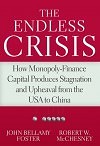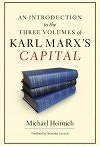Political Economy

The days of boom and bubble are over, and the time has come to understand the long-term economic reality. Although the Great Recession officially ended in June 2009, hopes for a new phase of rapid economic expansion were quickly dashed. Instead, growth has been slow, unemployment has remained high, wages and benefits have seen little improvement, poverty has increased, and the trend toward more inequality of incomes and wealth has continued. It appears that the Great Recession has given way to a period of long-term anemic growth, which Foster and McChesney aptly term the Great Stagnation. This incisive and timely book traces the origins of economic stagnation and explains what it means for a clear understanding of our current situation. | more…
This number of Monthly Review is a special issue on “Ecology: The Moment of Truth,” edited by Brett Clark, John Bellamy Foster, and Richard York. In the present issue we concentrate on the planetary environmental emergency. In a later special issue, to appear this fall, the magazine will address the social and economic regime change that is necessary to save the earth as we know it | more…
The rise in overt militarism and imperialism at the outset of the twenty-first century can plausibly be attributed largely to attempts by the dominant interests of the world economy to gain control over diminishing world oil supplies. Beginning in 1998 a series of strategic energy initiatives were launched in national security circles in the United States in response to: (1) the crossing of the 50 percent threshold in U.S. importation of foreign oil; (2) the disappearance of spare world oil production capacity; (3) concentration of an increasing percentage of all remaining conventional oil resources in the Persian Gulf; and (4) looming fears of peak oil | more…
For several decades following 1947, the modern large dam in India presented itself as a political conundrum, often voiced in strange, contradictory tones. In an oft-quoted speech in July 1954 Jawaharlal Nehru, India’s first prime minister (1947–64), likened the large dam to a “modern temple.” Later, in a less remembered speech before a gathering of engineers and technocrats in 1958, Nehru, as if in contrition, bemoaned the quest for big dams as a “disease of gigantism | more…
The first third of 2008 should have been a wake-up call to those who, in the short-lived days of capitalist triumphalism, were inclined to lose sight of the immediacy of the internal contradictions of capitalism and of the resistance that the system continuously regenerates. The enormous extent of today’s combined world food-and-economic crisis is now patently obvious. Anti-imperialist and anticapitalist initiatives are once again mushrooming around the globe. | more…
Crowded on the beaches were the inductees, some twenty million silent black men, women, and children, including babes in arms. As the sun rose, the Space Traders directed them, first, to strip off all but a single undergarment; then, to line up; and finally, to enter those holds which yawned in the morning light like Milton’s “darkness visible.” The inductees looked fearfully behind them. But, on the dunes above the beaches, guns at the ready, stood U.S. guards. There was no escape, no alternative. Heads bowed, arms now linked by slender chains, black people left the New World as their forbears had arrived. | more…
Andre Gunder Frank’s very long itinerary as a critical social scientist was marked by one unbudgeable constant. He was always committed to a left political agenda, and he was always analyzing the evolving current world situation as a left scholar-activist. I believe that the best tribute I can offer him is to do the same. Gunder’s father, Leonhard Frank, a distinguished novelist and man of letters, wrote toward the end of his life a novel based on his own life. Its title was Links, wo das Herz ist (“My Heart Is on the Left”). This would have been the most appropriate title for Gunder’s own never-written autobiography. | more…

Heinrich’s modern interpretation of Capital is now available to English-speaking readers for the first time. It has gone through nine editions in Germany, is the standard work for Marxist study groups, and is used widely in German universities. The author systematically covers all three volumes of Capital and explains all the basic aspects of Marx’s critique of capitalism in a way that is clear and concise. | more…
The subprime mortgage crisis that emerged late last summer in the United States led to a massive seizure in the world financial system that has had capital staggering ever since. This has now carried over to the “real economy” of jobs and income. As reported in the Wall Street Journal on April 4, “The National Bureau of Economic Research probably won’t say this for months. But why wait? The U.S. economy fell into recession sometime in January” (“Job Market Hints Recession Has Started”). World economic growth as a whole is expected to decline sharply this year… | more…
Noam Chomsky is an Institute Professor of Linguistics at the Massachusetts Institute of Technology. His most recent books are Interventions (City Lights, 2007), Failed States (Metropolitan Books, 2007), and Inside Lebanon: Journey to a Shattered Land with Noam and Carol Chomsky (Monthly Review Press, 2007). Gabriel Matthew Schivone is an editor of Days Beyond Recall: Alternative Media and Literary Journal and winner of the 2007 Frederica Hearst Prize for Lyrical Poetry.This article is based on an interview conducted by telephone and e-mail November 27, 2007–February 11, 2008. The interviewer thanks Mary Elizabeth Barnes for help with editing and transcribing this interview… | more…
As the United States braces itself for the onset of a recession, much of the blame for the current downturn is being attributed to the recent subprime mortgage crisis. While boom and bust cycles in real estate markets are nothing new, what distinguishes the current crisis is that the massive run-up in home prices was driven by the proliferation of new forms of securitized finance that permitted massive sums of loan capital to be pumped into the property markets. Only a few years prior these exotic financial products were being touted for their ability to hedge risk and achieve a more efficient allocation of credit. Buoyed by an exuberant sense that the wizards of Wall Street had so thoroughly transformed the nature of risk that the rules of the game had been fundamentally altered, investor demand for these securities exploded, and the underwriting and trading of these new forms of engineered debt underwent an extraordinary period of growth… | more…
Paul M. Sweezy was, in the words of his contemporary John Kenneth Galbraith, “the most distinguished of present-day American Marxists.” A Harvard-trained economist, his writings spanned some seven decades from the early 1930s to the closing years of the twentieth century. For more than half a century he was coeditor of Monthly Review, subtitled An Independent Socialist Magazine, which he founded along with Leo Huberman in 1949. Although first and foremost an economist, Sweezy was also a social scientist in a much broader sense. His impact on political science, sociology, history, and other disciplines was profound. He took the entire globe as his field of analysis, helping to enlarge our understanding of imperialism and of the necessity of revolution, particularly in the third world. | more…

